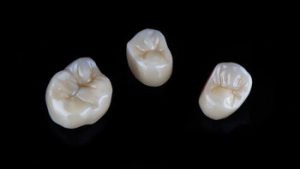Getting a dental crown is an important step toward a healthier and stronger smile. You might be thinking about what it takes to get one and how much it costs. Every crown is carefully crafted, making it a valuable part of restoring your tooth. The price can feel like a big decision, but understanding how it works makes it easier. Ready to learn more about what makes dental crowns so effective? Let’s explore how they can be a lasting solution for your smile.
What Is a Dental Crown?
A dental crown is a protective cap placed over a tooth to restore its shape and strength. This dental treatment is often used when natural teeth are damaged or weakened. Crowns come in different types, including porcelain crowns, which look like real teeth, and porcelain fused to metal, which combines strength with a natural appearance. Fused to metal crowns are especially durable and can be a good option for back teeth where more pressure occurs. These crowns are custom-made to fit your tooth, helping to improve its function and appearance.
How Much Does a Dental Crown Cost?
In Australia, dental crowns typically start at around $1,000 for each tooth. The total cost may differ based on the type of crown and where the tooth is located. To get an accurate price tailored to your needs, it’s best to speak directly with your dentist.
What Factors Impact the Price of a Dental Crown?
When considering a dental crown procedure, understanding what affects its cost can help you make an informed decision. Several factors play a role in determining the price, from the materials used to the care involved. Let’s explore what goes into the dental crown cost and why it can vary.
The Type of Crown
Customisation for Your Needs
Dental crowns are tailored to fit your tooth perfectly. This customisation ensures a comfortable fit and a natural look but also adds to the cost. The more detailed the crown’s design, the higher the price may be. This is especially true for front teeth, where appearance is a priority.
Location of the Dental Clinic
The price of tooth crowns can vary depending on where you get them. Clinics in cities may charge more due to higher operational costs, while those in smaller towns may offer more affordable dental crowns. It’s important to balance the cost with the quality of care provided to ensure you get the most appropriate treatment.
Materials Used in the Crown
The materials used also play a role in determining the dental crown cost. Metal crowns, often made of alloys, tend to be less expensive than porcelain crowns. However, porcelain or fused options provide a more natural appearance, which may make them worth the extra cost for visible teeth.
Preparation Needed Before the Crown
The dental crown procedure often involves preparing the tooth, which can affect the overall price. If additional work is needed, such as addressing decay or building up the tooth, these steps may increase the cost. Discussing your particular needs with your dentist will give you a clearer idea of what to expect.
Additional Services Included
Some clinics include extras in the total price, like consultations or follow-up visits to check the crown’s fit. These added services can make the treatment more convenient, but they may also raise the overall cost. Knowing what’s included helps you understand the value of the dental care you receive.
Choosing Quality Over Cheap Options
While cheap dental crowns might seem appealing, they may not provide the long-term durability or appearance you need. Investing in a high-quality crown can save you money over time by reducing the likelihood of repairs or replacements.
The cost of dental crowns depends on many factors, including materials, location, and preparation. By understanding these elements, you can choose a crown that fits your needs and budget. Speak with your dentist to learn more about the options available and how they can help you achieve a healthy, beautiful smile.
What Happens Step-by-Step During the Dental Crown Treatment?
If you’re considering this procedure, here’s what to expect during each step, explained in a simple and engaging way.
Step 1: Initial Consultation
The journey starts with a visit to your dentist, where they’ll examine your oral health and discuss whether a crown is the best option. They’ll check for issues like a broken tooth, weak teeth, or decay that could impact the tooth structure. This step ensures your tooth is ready for a crown and sets the stage for a personalised treatment plan.
Step 2: Preparing the Tooth
During the first session, the dentist prepares the tooth by shaping it to fit the crown. This involves removing damaged or decayed parts and reshaping the remaining tooth structure. If there isn’t enough tooth left, a filling may be used to build it up, ensuring a secure fit for the crown.
Step 3: Taking Impressions
Once the tooth is prepared, your dentist takes impressions or digital scans of the area. These detailed images are sent to a dental lab, where your permanent crown will be custom-made. This step ensures the crown fits perfectly and matches your natural teeth in shape and colour.
Step 4: Placing a Temporary Crown
While your permanent dental crown is being made, a temporary crown is put in place. It shields your tooth and lets you eat and speak as usual. It’s important to avoid hard or sticky foods during this time to keep the temporary crown secure.
Step 5: Fitting the Permanent Crown
When your porcelain dental crowns or other crown types are ready, you’ll return to the dentist for the final placement. The dentist carefully removes the temporary dental crown and cleans the area, then places the permanent crown, ensuring it fits perfectly and adjusting as needed.
Step 6: Securing the Crown
Once the fit and appearance are perfect, the permanent crown is secured with dental cement. The dentist ensures it is properly aligned with your bite and makes any final adjustments to maximise comfort and functionality.
Step 7: Post-Treatment Care
After the procedure, your dentist provides guidance on how to care for your crown and maintain good oral health.
The dental crown procedure involves several precise steps, each designed to restore your tooth’s function and appearance. Whether it’s a porcelain crown or another material, the process ensures a customised, long-lasting solution.
How Can a Dental Crown Boost Your Smile?
A dental crown is more than just a protective cap for a tooth—it plays a significant role in enhancing your smile. Whether it’s used for restoring a damaged tooth or improving aesthetics, a crown can transform your confidence and comfort. Let’s explore how it can make a difference.
Restore a Damaged Tooth
When a tooth is cracked, chipped, or weakened, a crown provides the support it needs to function properly. It covers the tooth entirely, restoring its strength and shape. For example, after a root canal treatment, a dental crown is usually put on to protect the tooth and keep it secure. This helps maintain the tooth’s integrity and prevents further damage.
Improve the Appearance of Your Smile
Custom crowns match your natural teeth in both size and colour. This makes them an excellent choice for fixing teeth that are chipped, stained, or misshapen. A crown can give you a more uniform and balanced smile, making you feel confident in how your teeth look.
Protect and Strengthen Weak Teeth
Replace Missing Teeth
When used with a dental implant or a bridge, crowns can replace a missing tooth. This not only fills gaps in your smile but also prevents other teeth from moving out of place. By maintaining proper alignment, crowns help preserve the overall structure of your mouth.
Boost Everyday Comfort
Crowns don’t just look good—they make chewing and speaking easier, especially if you’ve been dealing with a damaged tooth. By restoring the tooth’s shape and size, a crown ensures a proper bite, reducing discomfort and making daily tasks more comfortable.
Blend Seamlessly with Natural Teeth
One of the best features of crowns is their ability to blend with your existing teeth. Whether you’re addressing a front tooth or a molar, the result looks natural and enhances your smile without standing out. Modern materials used in crowns, like porcelain, ensure a lifelike finish that’s both durable and visually appealing.
Long-Lasting Solution
With proper upkeep, tooth crowns can last many years. Their durability and strength make them a dependable choice for restoring teeth. This long-term solution not only improves your smile immediately but also supports your oral health in the future.
A crown can enhance your smile by restoring damaged teeth, improving their appearance, and providing lasting strength. Whether it’s protecting a tooth after a root canal treatment or filling a gap with a replacement, crowns are a versatile and effective option.
How Can You Look After Your Dental Crown to Keep It in Good Shape?
While crowns are made to last, proper care is necessary to maintain their strength and appearance. Follow these tips to keep your crown in great condition and your smile shining.
Brush and Floss Daily
Good oral hygiene is key to protecting both your crown and natural teeth. Brush gently with a soft toothbrush to avoid damaging the crown’s surface. Flossing around the crown helps remove food particles and plaque, preventing decay or gum issues that could affect its fit. Your dentist may recommend specific flossing tools for easier cleaning around the crown.
Choose the Right Toothpaste
Not all toothpaste is safe for crowns. Some abrasive formulas can wear down the material, reducing its smooth finish over time. Use a gentle, non-abrasive toothpaste that’s effective at cleaning without scratching. Ask your dentist for recommendations if you’re unsure which one to use.
Avoid Hard or Sticky Foods
While crowns are strong, certain foods can still pose a risk. Chewing on hard items like ice, nuts, or hard lollies can crack or damage the crown. Sticky foods such as toffees or caramels might pull on the crown, causing it to loosen. Opt for softer, tooth-friendly options to keep your crown secure and in good shape.
Protect Your Crown from Grinding
If you grind your teeth while sleeping, it can stress your crown. A night guard could be suggested by your dentist to shield both your crown and natural teeth. Using this guard consistently can prevent unnecessary damage and prolong the life of your crown.
Schedule Regular Dental Visits
Routine check-ups are vital for maintaining the health of your crown and surrounding teeth. During these sessions, your dentist will inspect the crown’s fit and condition, ensuring there are no issues like loosening or wear. Professional cleanings also help keep the area around your crown free from plaque and bacteria.
Rinse After Meals
When brushing isn’t available after meals, rinse with water or mouthwash to remove food debris. This simple step helps prevent decay around your crown and keeps your mouth fresh.
Treat Your Crown with Care
Crowns are strong, but they still need gentle treatment. Avoid using your teeth as tools to open packages or bottles, as this can damage both the crown and the surrounding teeth. Treating your crown carefully will help it last longer and maintain its appearance.
Monitor for Changes
Taking care of your dental crown involves simple but important steps like brushing, flossing, and avoiding harmful foods. With proper care, your crown can stay in excellent shape for many years. Regular dental visits and mindful habits will ensure your crown continues to protect and enhance your smile.
Protect Your Tooth with Confidence
Understanding the cost of dental crowns is an important step in restoring and protecting your teeth. A dental crown can make your tooth stronger, improve its look, and help you feel confident again. We’re here to guide you through your choices and find what suits your needs best. If you’re ready to take the next step, please call us on 07 4801 7035 today. Let’s help you enjoy a healthier, brighter smile that lasts!
References:
https://www.healthdirect.gov.au/dental-crown-procedure
https://medlineplus.gov/ency/article/007631.htm



